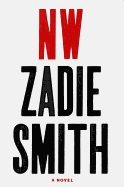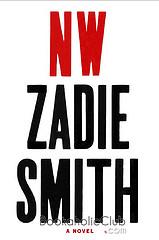
 In NW, her third novel since White Teeth, Zadie Smith uses lean stream-of-consciousness narration tethered to taut skeins of dialogue to portray the aspirations and agitations of a trio of characters who have migrated varying distances from their shared roots in a northwest London housing estate. (The London postal code "NW" covers a broad range of districts, from working class to fairly posh, with NW10 being a far socio-economic cry from NW8). Smith's characters are ethnically "diverse," but the subject of her novel is more existential than multicultural--all three principals struggle to inhabit their adult, free-will professional and personal lives with conviction after emerging from childhoods confined by cultural norms, familial expectations, geographical allegiance and immigrant anxiety.
In NW, her third novel since White Teeth, Zadie Smith uses lean stream-of-consciousness narration tethered to taut skeins of dialogue to portray the aspirations and agitations of a trio of characters who have migrated varying distances from their shared roots in a northwest London housing estate. (The London postal code "NW" covers a broad range of districts, from working class to fairly posh, with NW10 being a far socio-economic cry from NW8). Smith's characters are ethnically "diverse," but the subject of her novel is more existential than multicultural--all three principals struggle to inhabit their adult, free-will professional and personal lives with conviction after emerging from childhoods confined by cultural norms, familial expectations, geographical allegiance and immigrant anxiety.
The two main female characters, Leah Hanwell and Natalie De Angelis (née Keisha Blake) have been friends from age four to their present mid-30s; Felix Cooper is a contemporary who lives in their periphery and whose noble story arc bridges their sections. NW begins with Leah contemplating her reproductive ambivalence in a hammock, an opening that would have been fatally limp if Smith's language were less lithe and lyrical. A begging female tough prises Leah from her stupor and NW delivers the first of many great scenes powered by dialogue. The novel illuminates contemporary cultural frictions by investigating the progress of Leah's and Natalie's relationships and careers. Felix's quest takes the reader across London and depicts the fraught pressures of modern manhood. Smith establishes her characters' dilemmas with astute insight; although there is plenty of dramatic incident, the only actions that strain credulity occur at the height of Natalie's ontological crisis.
Readers seeking a conventional narrative may be frustrated by NW's challenging stream-of-consciousness segues, hodgepodge typography, dearth of dialogue tags and fungible structure (the third major section, Keisha/Natalie's coming-of-age story, is told in numbered text fragments that work surprisingly well), but only about 10% of the text requires actual puzzling out.
By limiting most of her authorial prose to character thought and by delivering gobs of visceral dialogue Smith virtually embeds the reader alongside her broad cast of NW residents. One does not read NW so much as eavesdrop on it. Smith has moved beyond the somewhat hyper comic tone of White Teeth and the descriptive indulgences of On Beauty to write her most empathetic, humanly vulnerable novel to date. NW is a novel of voices, all of which deserve to be heard." --Holloway McCandless, blogger at Litagogo: A Guide To Free Literary Podcasts
Shelf Talker: Smith offers a transatlantic counterpoint to A Visit from the Goon Squad in a portrait of young Londoners struggling to design their lives against external expectations.

